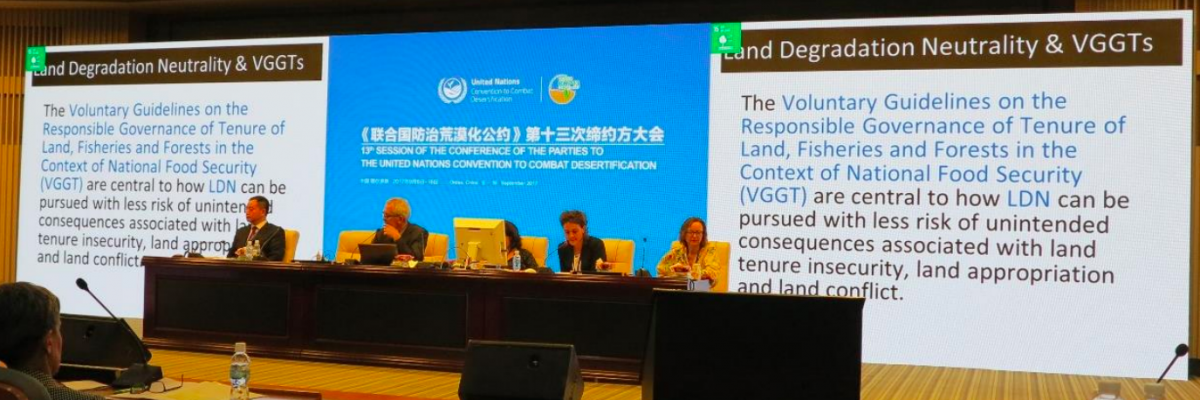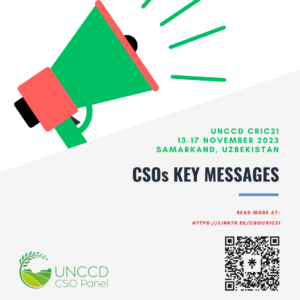Side Event launches the UNCCD CSO Panel Report on Land Rights
How securing rights to land and other natural resources can contribute in achieving the Land Degradation Neutrality (LDN) targets and Sustainable Development Goals, along with the associated improvements in food, water, and livelihood security.
A new report on the importance of land rights in the securing sustainable life on land for the people of the planet. Published by the CSO Panel of the UNCCD, the report “Land Rights for Sustainable Life on Land”, the report provides an overview of the key issues related to land rights that are of importance in the context of LDN and the Convention.
As UNCCD, the CSO Panel, and partners in government, civil society and the donor and investment communities move forward with LDN targets, the role of land rights in both degradation and recovery processes are brought to the fore.
The Report provides policy and practice options and recommendations for using land rights as a set of tools in both the prevention of land degradation, and in the recovery of degraded lands. The document draws on the UNCCD CSO Panel’s expertise, along with the current scientifc, policy and practitioner literature on land rights and degradation.Switzerland, champion of land restorationand supporter of the civilsociety work highlighted how importantit is to include land rights inthe implementation of this Convention.The head of the Swiss delegation,Ms Christina Blank provided theopening keynote, and remarked “If you want to have sustainable landmanagement it will cost time andmoney, but this is no excuse for inaction.Unsustainability will cost youeven more”. In many developingcountries, women from rural areasare migrating to the towns becausethey do not have access to the land:land right will help to reverse the situation.
A delegate gave an example from Namibia, which illustrated how appropriate policies relating to customary land tenure can be developed for improved management of the land.
Ecuador, the current Chair of the G77 + China, highlighted the best practices of his country, where land rights are linked to the lives of people and the land in the context of the right of Mother Earth, which recognises the rights of the land itself.
In his closing remarks, Mr Marcos Montoiro of the UNCCD Secretariat appreciated the important role that the CSOs have been playing in putting the issue of land rights on the table of the COP.
The pressing question that must be addressed is how government can understand the urgency and importance of land rights for promoting sustainable land management? It is now, more than ever, time to push for land rights for people, if we are to achieve the objectives of the Convention through the LDN process.
Francophone Day at COP 13
Thursday 7 September 2017 was the ‘Francophone Day’ at the COP. Organized by the Institut Francophone du Développement Durable (IFDD), it consisted of three main stages: the presentation of the negotiating guide for the United Nations Conference to Combat Desertification, the presentation of a special issue of the Bulletin Liaison Énergie Francophonie no.105, “Desertification and land systems: from recognition/knowledge to action” and, an exchange workshop on the operationalization of neutrality in land degradation.
The document highlights not only the facts, but also some hot issues that should be closely followed in the course of the negotiations processes.
A presentation by CARI based on the document stemming from the Desertif’Actions Summit held in Strasbourg in June 2017 highlighted the efficiency of preparatory meetings of non-State actors before international negotiation meetings. In Strasbourg, the meeting was morefocusing on the role and responsibilities of local authorities in combatingland degradation and themore focused aspects of these localrooted stakeholders that havein many cases a mandate in landscape management in their area.
The third Session of the Francophone Day was dedicated to the LDN. Delegates were particularly concerned about the availability and quality of data to elaborate the baseline assessment of LDN and for monitoring their target. The financing issue was also a concern, and the need to capacitate stakeholders not only on collecting data, but also on the use indicators was underlined. Add-value of investment in bright spots to up-scale good practices was noted as a way to plead for transformative projects not only in identified spots but also in the other zones were economic profitability of some actions can be attested.






